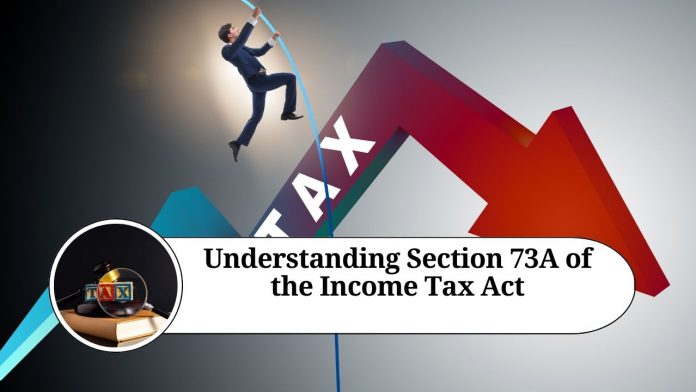Understanding Section 73A of the Income Tax Act
Section 73A of the Income Tax Act, 1961 is a provision that deals with the treatment of loss incurred in speculative business transactions. Let’s break down the provisions of this section in detail.
What are Speculative Business Transactions?
Speculative business transactions refer to transactions where a taxpayer buys or sells certain commodities, such as shares, securities, and derivatives, with the sole intention of making a profit. These transactions are considered speculative in nature as they involve a high degree of risk and uncertainty.
Treatment of Losses Incurred in Speculative Business Transactions
Under Section 73A, if a taxpayer incurs a loss from a speculative business transaction, they can only set off this loss against profits earned from other speculative business transactions. This means that a taxpayer cannot use a speculative business loss to offset gains earned from non-speculative business transactions, such as income from salaries, rent, or interest.
Carry Forward of Unabsorbed Losses
Additionally, if a taxpayer is unable to set off the entire speculative business loss against profits earned from other speculative business transactions in the same financial year, they can carry forward the unabsorbed loss to the following year. However, the unabsorbed loss can only be set off against profits earned from speculative business transactions in the following year.
Conditions for Carry-Forward of Losses
It’s important to note that the carry-forward of speculative business losses is subject to certain conditions. For instance, the taxpayer must have filed their tax returns within the specified due date, and the loss must be certified by an accountant.
Set-Off of Non-Speculative Business Losses
Furthermore, the section also provides for a set-off of non-speculative business losses against speculative business profits. This means that if a taxpayer incurs a loss in a non-speculative business, such as a regular business or profession, they can set off this loss against profits earned from speculative business transactions.
Read more useful content:
- section 145 of income tax act
- section 10e of income tax act
- section 9 of the income tax act
- section 94b of income tax act
- section 206aa of income tax act
Frequently Asked Questions (FAQs)
What is a speculative business transaction?
A speculative business transaction is a transaction where a taxpayer buys or sells certain commodities, such as shares, securities, and derivatives, with the sole intention of making a profit. These transactions are considered speculative in nature as they involve a high degree of risk and uncertainty.
Can speculative business losses be set off against non-speculative business profits?
No, speculative business losses cannot be set off against non-speculative business profits. They can only be set off against profits earned from other speculative business transactions.
Can unabsorbed speculative business losses be carried forward to the next year?
Yes, unabsorbed speculative business losses can be carried forward to the next year. However, they can only be set off against profits earned from speculative business transactions in the following year.
What are the conditions for the carry-forward of speculative business losses?
The carry-forward of speculative business losses is subject to certain conditions. For instance, the taxpayer must have filed their tax returns within the specified due date, and the loss must be certified by an accountant.
Can non-speculative business losses be set off against speculative business profits?
Yes, non-speculative business losses can be set off against speculative business profits. This means that if a taxpayer incurs a loss in a non-speculative business, such as a regular business or profession, they can set off this loss against profits earned from speculative business transactions.
How can taxpayers ensure compliance with Section 73A of the Income Tax Act?
Taxpayers engaging in speculative business transactions should keep the provisions of Section 73A in mind and ensure that they file their tax returns on time and get their losses certified by an accountant. It is also advisable to consult a tax expert to understand the implications of speculative business transactions on their tax liability.




















